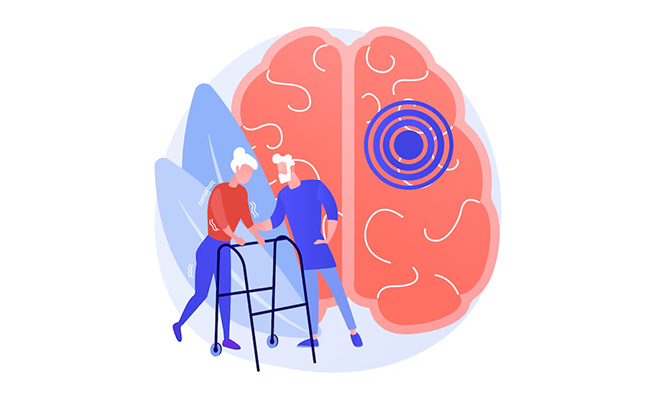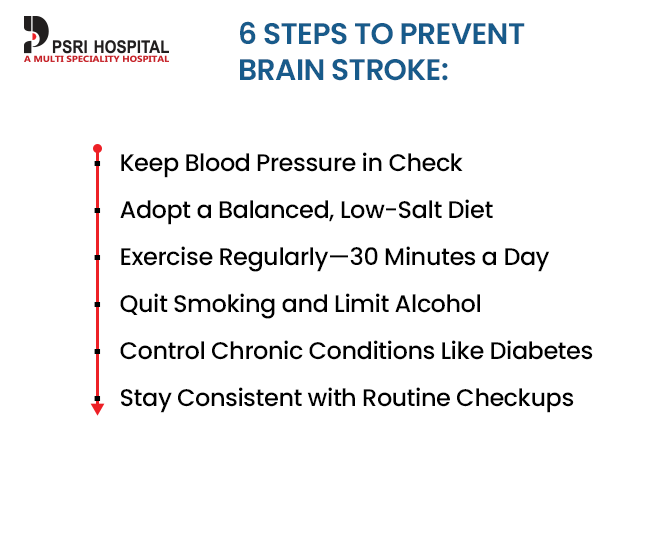Preventing Brain Strokes: Lifestyle Changes and Risk Factors

A brain stroke can disrupt life in unimaginable ways, but did you know that most strokes are preventable? Your daily habits play a critical role in safeguarding your brain health. Small but meaningful actions, like eating the right foods, exercising, and managing stress can drastically lower your risk. Do you understand the factors that increase your stroke risk or the changes you can adopt to stay protected?
In this blog we will cover all the essential insights about Preventing Stroke, implementing lifestyle changes after stroke, and the importance of stroke prevention exercises. We will also discuss how institutions like PSRI Hospital, recognized as the best neuro hospital in Delhi NCR, can support your journey toward better health.
Understanding Causes and Risk Factors of Brain Strokes
A stroke happens when blood supply to a part of your brain is interrupted or reduced, depriving brain cells of oxygen and nutrients. This can lead to severe outcomes, such as paralysis, speech difficulties, or memory loss. However, by understanding the underlying causes, you can take steps to prevent it.

Major Risk Factors for Brain Strokes
Some risks are controllable, while others, such as genetics or age, are beyond our control. Here’s what you need to know:
- High Blood Pressure (Hypertension): A top contributor to strokes, often termed the ‘silent killer.’
- Diabetes and Obesity: Both conditions raise the chances of blood vessel damage, leading to strokes.
- Smoking and Excessive Alcohol Use: These habits weaken blood vessels and increase the risk.
- Lack of Exercise: A sedentary lifestyle often leads to obesity, high cholesterol, and poor circulation.
- Family History and Aging: While these factors cannot be changed, proactive management can help.
Recognizing Stroke Symptoms Early
It’s crucial to identify stroke warning signs early to minimize damage. Look for:
- Sudden numbness or weakness in the face, arms, or legs.
- Confusion, trouble speaking, or slurred speech.
- Vision disturbances or loss of balance.
- Severe headache with no apparent cause.
Lifestyle Changes After Stroke for a Healthier Future
For individuals recovering from a stroke, adopting healthy habits is very essential. By making the following lifestyle changes after stroke, you can reduce the chances of recurrence and improve overall quality of life.
1. Focus on a Balanced Diet
What you eat impacts your brain health directly. Post-stroke recovery demands a heart-healthy diet to prevent complications:
- Choose foods rich in nutrients, such as fruits, vegetables, and whole grains.
- Opt for lean proteins like fish and legumes.
- Cut down on saturated fats, processed foods, and excess salt to manage cholesterol and blood pressure.
2. Engage in Stroke Prevention Exercises
Physical activity strengthens the heart and improves circulation, significantly lowering stroke risk. Effective stroke prevention exercises include:
- Aerobic Activities: Walking, swimming, or cycling for 30 minutes daily.
- Yoga and Tai Chi: Enhance flexibility and mental calmness.
- Strength Training: Boosts muscle health, which is critical after a stroke.
3. Quit Harmful Habits
If you smoke or consume excessive alcohol, now is the time to stop. Both habits harm blood vessels, increasing the chances of another stroke.
4. Manage Chronic Conditions
Proper control of hypertension, diabetes, and cholesterol levels can dramatically lower risks. Consult a trusted healthcare provider regularly for personalized management plans.
5. Monitor Your Emotional Health
Depression and anxiety are common after a stroke. Addressing mental health through therapy or counseling can aid recovery and prevent further health complications.
Preventing Stroke with Regular Medical Guidance
When it comes to Preventing Brain Stroke, expert advice is invaluable. Institutions like PSRI Hospital, recognized as the best neuro hospital in Delhi NCR, offer advanced preventive care services. Let’s understand why Regular Checkups Matter?
- Early Detection of Risks: Routine screenings can detect high blood pressure, cholesterol, or heart issues early.
- Personalized Health Plans: Specialists create tailored lifestyle and treatment recommendations.
- Comprehensive Care: From diagnostics to rehabilitation, hospitals like PSRI provide holistic care to support stroke prevention.
Top Tips for Preventing Brain Stroke
Preventing brain strokes doesn’t have to feel overwhelming. By integrating the following habits, you can protect your brain health:
- Monitor Blood Pressure: Keep it under control with diet, medication, and stress management.
- Maintain a Healthy Weight: Balanced nutrition and exercise go a long way.
- Limit Sugar and Salt Intake: Reduce processed foods to minimize stroke risks.
- Stay Active: Make physical activity a non-negotiable part of your daily routine.
- Consult a Neurologist Near You: Regular visits can help you stay ahead of potential risks.
Conclusion
Preventing brain strokes is within your control through awareness, consistency, and the right medical guidance. By making smart choices and consulting trusted medical professionals like the best neurosurgery hospital in Delhi, you can significantly reduce your risks and lead a vibrant life. Whether you need guidance on lifestyle changes after a stroke or are looking for tailored advice on stroke prevention exercises, comprehensive care is within reach at PSRI Hospital. Your brain is your most valuable asset. Take charge by consulting the experts at PSRI Hospital today, known for their excellence in stroke prevention and care. Book your appointment with the best neurologist in South Delhi and safeguard your future today.
FAQs
What is the most common cause of a stroke?
Ans. High blood pressure is the most common cause, emphasizing the importance of regular monitoring and control.
Can stroke prevention exercises really help?
Ans. Yes, consistent physical activity reduces several risk factors, including high cholesterol, obesity, and poor circulation.
Is a family history of strokes unavoidable?
Ans. Genetics play a role, but proactive lifestyle changes and routine checkups can mitigate the risk.
Should I consult a specialist for stroke prevention?
Ans. Absolutely. A neurologist can assess your risk factors and provide preventive strategies. Hospitals like PSRI, the best neurosurgery hospital in Delhi, excel in this area.
What role does diet play in stroke prevention?
Ans. Diet significantly influences blood pressure, cholesterol levels, and overall brain health, making it a cornerstone of stroke prevention.

 Book An Appointment
Book An Appointment Virtual Consultation
Virtual Consultation





